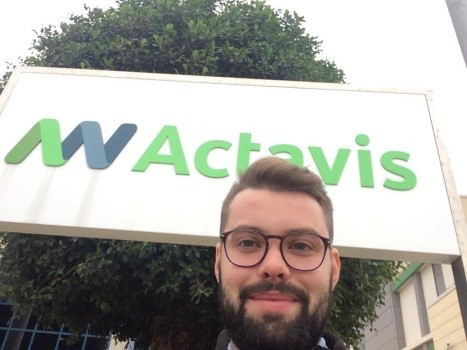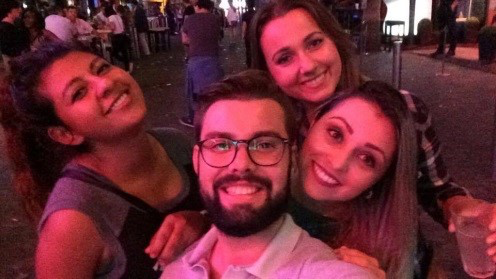

Student internship abroad is an excellent and unique experience.
The student of mechanical engineering, Jakob Urbančič, completed 11 weeks of practical training in Malta thanks to the Erasmus+ grant. He did his study mobility for the purpose of practical training at Actavis Ltd, where he gained useful work experience and many new acquaintances. He’s excited about the experience.

I've heard so much about Erasmus that when I received the school message, I immediately said to myself “I have to try this!” (Who wouldn't want to extend the summer for two more months?) When? I was no longer sorry for my (only) temporary employment! I immediately checked the weather – Malta: air 25°C, sea 24°C. Oh yes, that’s it, but – it’s an internship, not an Erasmus funded studies... That’s crazy! OK, I have to go to the administration office tomorrow and will definitely arrange something at work. I directly asked Klemen from the administration office about what the realistic chances are for me to land in Malta in October. He smiled a little and said that the possibilities were great.
We have contacted the agency through which mobility took place. I could look for the employer and the accommodation myself, but I chose to arrange it this way due to the lack of time. I would also recommend the same to others who later on decide for Erasmus+ (the price and implementation are excellent). The agency found a suitable job, accommodation, organised transport from/to the airport, and were of course always available for any information. For the recognition of practical work in one year of study, 400 hours must be completed, so we agreed for the internship to last 11 weeks. We arranged all the necessary paperwork, and on 2 October 2016 I flew from rainy and dreary 18°C to sunny and sultry 30°C. The cheapest way to Malta is from the airport of Treviso, where the low cost carrier Ryanair organises flights three times a week at a very affordable price. The flight lasts two hours. Luqa is a small and organised airport, so you quickly get around. The driver was already waiting for me at the agreed spot, which is really very convenient. Buses drive from the airport to the city every hour, but are very crowded during the tourist season. Plus, the bus doesn’t drop you off in front of the apartment door (I believe it would take me quite some time to find the right address as they barely have house numbers there). The apartment is located in the area of the island called Qormi. I first lived in the apartment with two roommates (a Polish and a Kazakh girl) and one unusual French guy. We got along very well with the girls and stayed in touch. In the afternoons, we went exploring the island several times to prevent boredom. During the week, we were mostly sightseeing architecture or visiting museums. Malta has very rich cultural heritage. The very view of the mighty architecture (predominated by rock) of the capital Valletta pleasantly surprises you. On the weekends, we enjoyed all-day trips in the style of “there is nothing better than lying on the beach…”.

Due to its key strategic position in the middle of the Mediterranean, Malta has been a crossroads of very different cultures throughout its history. It was an English colony until 1964, which is evident to this day. They have two official languages, Maltese and English. English is spoken by a large majority, including the elderly (as soon as you hear the conversation between the locals, you are very grateful for the English), so there was no problem with the communication. The English cuisine too left its impact as well as driving on “the wrong side of the road”. There are truly many English people on the island, especially during the tourist season, and there are also some pensioners who move to Malta. Food here is mainly Italian-English, but unfortunately mostly very poor in quality and tasteless. Of course, it is obvious they don’t have self-sufficient farming and must import almost all the food. Their speciality is a rabbit stew, and in the morning, you cannot avoid seeing at least one Englishman on the terrace of the bar excitingly consuming the good old full English breakfast.
It becomes clear to the visitor from the start that the mentality here is completely different than in the more developed countries of the EU. It is very obvious that locals, except on the road, are in no hurry (traffic is classic Mediterranean). It is also worth noting that ecological awareness is not their first concern (I believe not even in the top 20). The larger cities are quite tidy and clean, and when you drive a little further, the picture is completely different. The garbage is everywhere and separated only at the airport. Traffic in Malta is a disaster! Not only do they ride on “the wrong side”, but the fact that there are more than 346,000 vehicles on an island with a population of 450,000 people is also worrying. For comparison, you can imagine the island of Krk that is very well known to Slovenians. Well, Malta is smaller by almost 100km2. Of course, the cars of the older generations prevail, so the air is quite polluted during the morning rush hours. It is not pleasant to wait at a bus station with half-combusted diesel in your lungs. Interestingly, there are very few motorcyclists or moped drivers in traffic. Given the weather conditions and short distances, I would expect a lot more of them, but obviously it doesn’t count if it’s not a car. Pedestrians are very badly taken care of in the traffic. There are very few arranged crosswalks and pavements. An also, of course, the first 14 days when crossing the road, you are checking the wrong direction (which can be quite an adrenaline sport). Before going to the island, I was thinking of buying a bike for these almost three months, but these roads are truly not intended for cyclists. They are mostly very narrow, and the drivers are quite crazy and egoistic, there are no arranged cycling trails, so you have to settle for public transport. Public transport lines are satisfactorily branched across the island, most of the places are accessible without multiple transfers. The punctuality of buses is more problematic. In the morning, it is pointless to check the timetable. Just get yourself to the bus station and wait. You have to signal to the driver with your hand raised that you want to get a ride, and if the driver waves back, you sit quietly and wait for the next one. This happens mostly in the morning in the vicinity of major cities, and on Fridays and Saturdays in the evening on the route of Valletta–Sliema, as almost all young people go to Paceville. Night life in Malta is quite varied. The centre of activity is the previously mentioned part of the island, where all night clubs are located. Due to a large number of students, party is guaranteed every day of the week. We even had Erasmus parties organised on Tuesdays, which was great for getting to know new people literally from all over the world. If you ever walk around the island on a Sunday, you will surely be surprised by the bars full of locals (according to the law, they can drink and sell alcohol to 17-year-olds) and the amount of alcohol on their tables. On Sundays, they have a day for themselves and that’s that (all shops are closed too).

I was on an internship in Actavis. It is a global pharmaceutical company founded in 1984 in Illinois, USA. Currently, the main headquarters of the company are in Dublin and New Jersey, and production is scattered in 40 countries across the world. It took me about 20 minutes to walk from home to work and 1–2 hours of a bus, depending on traffic (and the question in the first week was also whether I was at the right station). I went to the company together with the representative of Easy Bridge Job on the first day, so we could discuss all the details of the work with the mentor. As soon as entering the reception, it is obvious that there is more than enough money in the pharmaceutical industry. The whole building is very nice and always clean due to the high standards (cleaning personnel working 24/7). I worked in the technology department, in a cosy atmosphere of 12 co-workers. In principle, my work was the finishing, processing and checking of drawings in AutoCAD. I worked on drawings of a new, modern and technologically perfected warehouse called B15. I updated both mechanical (fire sprinklers) and electrical systems (fire sensors, lighting, safety systems, etc.). However, in order for the work not to be too stationery and monotonous, I agreed with the maintenance department to join them in the emergency maintenance works. The strict standards and conditions for manufacturing medicinal products require constant control of temperature, humidity and pressure in the production premises. So, there is a lot of work with the sensors itself and with preventive maintenance. I gained most of the new experiences in the field as I worked on projects or systems I didn't know before. I was surprised by the general knowledge of Paul (a colleague with whom I worked most of the time) as he mastered mechatronics, electrical engineering and mechanical engineering as well as programming. Above all, I was glad that he took the time to answer each of my questions and fully explain the problem to me. Fortunately for me, administration offices were being renovated during my mobility time. With the trust of my mentor, I carried out a few small projects from beginning to end (measurements, ordering material, supervision of subcontractors), which was also a unique new experience.

The time of departure was getting closer faster and faster. I just got used to the new environment when it was time to leave. The final week was very busy as the farewell parties lined up one after the other. Unfortunately, all good things come to an end, and so these 11 weeks passed by faster than one month would. It was really hard to separate from all my new friends, two of them immediately flew after me to Slovenia for a short visit.
I sincerely thank the school for this opportunity offered and all the knowledge and experience I have gained. Where to go next year?